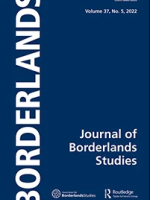Affective borderwork

In recent years, migrants and local populations in the so-called origin countries have been exposed to a wide range of risk-awareness and migration-information campaigns. These European-funded campaigns have the purpose of making migrants rethink and ultimately abandon their migration projects long before they attempt to reach Europe.
At the same time in Europe, large numbers of migrants have had their asylum cases rejected and are waiting to get deported. Here, motivational interviews are used by European states to put increased pressure on the soon-to-be-deported migrants to make them comply with their return orders. New article illustrate the volatile and widespread diffusion of emotive strategies used in contemporary European migration governance.
In the article DIIS senior researcher Ida Marie Savio Vammen and postdoc at the University of Copenhagen Katrine Syppli Kohl compare two cases: on the one hand, an information campaign in Senegal targeting the sending community of so-called ‘potential migrants’ and their families; on the other hand, a series of motivational interviews with asylum seekers who got rejected in Denmark. Using the theoretical lens of affective borderwork, the article shows the crucial role affection and emotions come to play in these encounters.
The researchers highlight how negative emotions of fear, shame, hopelessness, and despair are used to deter migrants and remove any hope that they can make it in Europe. While positive emotions related to patriotism, development and care and closeness to family and loved ones are evoked to rebrand communities of origin in an attempt to ‘welcome back’ both 'potential', and 'rejected' migrants in the name of a better future as engaged citizens in their countries of origin.

Yet the article also draws attention to how the people exposed to these affective interventions react and thus calls attention to their agency. Instead of resulting in the desired change in unwanted migrants’ aspirations and decisions, the interventions often give rise to resistance and feelings of anger and despair. Migrants resist the reproduction and normalization of an unequal world order that excludes them from mobility and relegates them to underprivileged positions.
Furthermore, they do not accept the too-simplistic narrative that depicts migrants’ homelands as safe spaces of care and proper livelihood possibilities, while Europe as a barren land of failure and the path to get there as rife with death and violence. Finally the article emphasizes how, despite their seemingly limited effectiveness, these ‘soft governance’ interventions continue to constitute migrants’ desire for mobility as illegal and depict them as actors responsible for their own exclusion – or even death – absolving European states from the responsibility for their plight.
DIIS Experts




